
Fill The Bill – December 2016, Canadian Packaging
By Andrew Joseph, Features Editor; Photos by Naomi Hiltz
Automation General Bottling Cartoning Case Packing Coding & Labeling Controls/Drives Conveying Corrugated Bonfiglioli Risuttori S.p.A. Crown Holdings Inc. Custom Drink Carriers Inc. Doverco Inc. Ferrum Ltd. Kosme s.r.l. Krones Machinery Co. Ltd. Lagrotta Packaging Group Inc. McBrady Engineering Newlands Systems Inc. Packaging Technologies Inc. Regal-Beloit Corporation Rexam Inc. Rockwell Corporation Royal Containers Ltd. slideshow Tapp Label Ltd. TricorBraun Canada Wellington BreweryCanada’s oldest craft brewer leaps into the future with new high-tech filling lines to boost productivity and reach a larger audience.
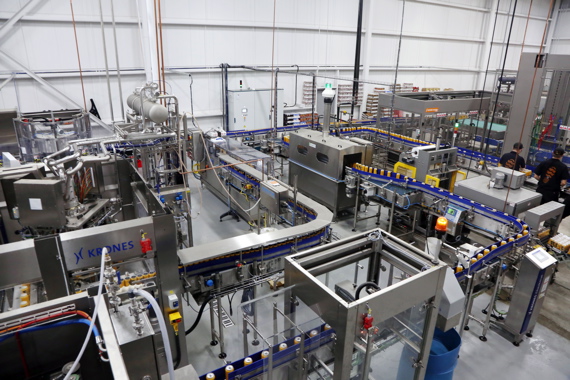
A bird’s-eye view of the spanking new canning line, manufactured by leading German beverage production equipment manufacturer Krones AG, installed this past summer at Wellington Brewery’s newly-expanded beermaking facility in Guelph, Ont., to help Ontario’s oldest craft-brewer regain its once-prominent position in the fast-growing craft beer market with higher output levels, a more automated brewing, filling and packaging process, and broader product variety.
The North American craft brewing industry has been experiencing fantastic growth over the past decade—providing grateful beer connoisseurs with quality, variety and flavor akin to the days of yore, when every self-respecting drinking establishment brewed their own house beer right on the premises.
Over the past 20 years or so, the Canadian craft beer industry has evolved from guys in the basement producing home-brewed suds into a professional industry where quality and consistency of taste is as important as the desire to produce beer varieties beyond the norm of the industry’s multinational mass-production giants.
Wellington Brewery, located on the northwest edge of Guelph, Ont., is Canada’s oldest independently-owned craft brewery. Established in 1985, the company now employs 50 full- and part-time employees to produce its popular beer brands.
“We were part of the first wave of Ontario microbreweries that started up after changes to an outdated provincial law allowed small breweries to operate,” Wellington Brewery president Brent Davies told Canadian Packaging magazine during a recent visit to the 19,000-squarefoot facility, which was expanded an
overhauled over the past year to add 12,000 square feet of additional production space.
To accommodate the expansion, brewery moved its administration offices across the street from the brewery plant.
Also operating a distribution warehouse in Toronto, Wellington Brewery had been producing between 20,000 and 25,000 hectoliters of beer over the past few years, but Davies now expects that total to quadruple to about 100,000 as a result of the expansion and comprehensive equipment upgrades.
“Industry trends show that nowadays customers prefer their retail beer purchases to be packed in cans over bottles,” notes Davies, “which is why 50 per cent of our production is geared towards cans, 30 per cent for draught beer in kegs, with the remaining 20 per cent in bottles.”
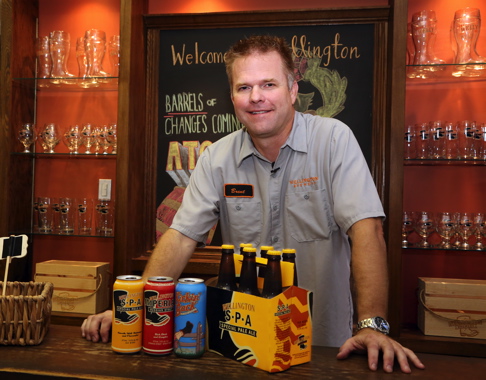
Wellington Brewery president Brent Davies says the past 12 months have been stressful but exciting for Ontario’s oldest craft brewery, as it more than doubled the size of its brewing facility, while installing a new brewhouse and highly automated can and bottle filling lines manufactured by Krones AG.
Core brands from Wellington Brewery are its best-selling S.P.A (Special Pale Ale), Trailhead Lager, County Brown Ale, Arkell Best Bitter, Kickin’ Back Dry-Hopped Session Ale, Iron Duke Strong Ale, and the Imperial Russian Stout—in 355-ml bottles and 473-ml cans, and can be found at the LCBO (Liquor Control Board of Ontario), the Beer Store, participating grocers, and over 400 active accounts with bars and restaurants across southern Ontario.
Wellington Brewery founder Phil Gosling’s plan was to only produce English-style real ales (also known as Cask Conditioned Ales), an unfiltered, unpasteurized, naturally carbonated beer served from a cask without adding nitrogen or carbon dioxide pressure.
Davies notes that its Imperial Russian Stout is patterned after the highly-fortified stout that Great Britain exported to Russia in the 1800s, so the English link remains.
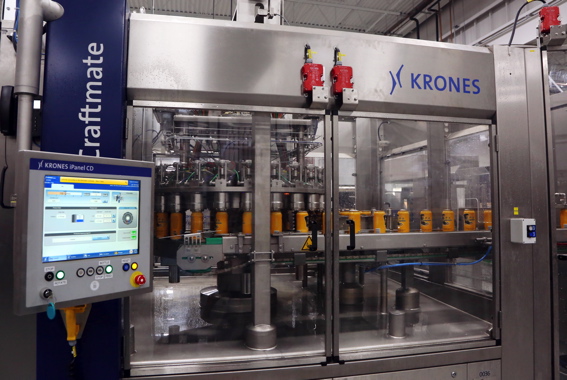
Designed specifically for craft brewing operations, the 24-valve Krones CraftMate volumetric rotary can filler is able to handle beer cans of various size and formats at speeds starting from 12,000 containers per hour, providing a highly cost-effective solution for lower-output craft brewers such as Wellington Brewery.
“Wellington Brewery was one of the first modern brewers in North America to produce cask-conditioned ales,” relates Davies, adding that the taste profile has become very popular over the past decade or so.
“Because Gosling wanted our beer recipes to closely match the flavor and character of the British Ales, our original brewhouse and most of the brewing equipment was shipped directly from England to Guelph,” says Davies who first joined the brewery in 1991 through 1996.
Success came quickly for Wellington Brewery, with the company winning local and national brewing awards as early as 1987.
Davies was coy as to the naming of the brewery: either arising because Guelph is located in Wellington County, or perhaps it was named after the Duke of Wellington, or perhaps because everyone thought the boots were kind of neat.
“It’s a lot of each, actually,” says Davies. “We are phasing out the brand’s former image of the Duke of Wellington, and are utilizing the tag line of ‘Try a Welly on’ with the famed rubber boot being standard footwear on our staff, as well as on our beer packaging and promotional items.”
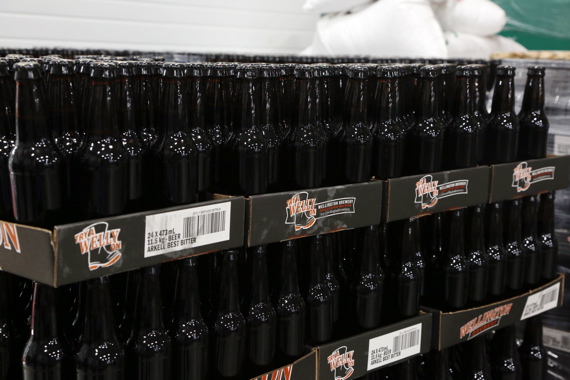
Supplied by Royal Containers, each pre-printed corrugated tray can hold 24 glass bottles manufactured by TricorBraun.
After new ownership consisting of Mike Stirrup and Doug Dawkins came aboard in 2000, Davies was back in the saddle in 2010 when he bought out Stirrup who was retiring.
“Doug passed away this June, and while I am loath to assume his job title, I have, as of September, assumed his duties,” mentions Davies.
While the passing of the company president and friend was jarring to say the least for the genial Davies, his stress levels were further increased because his Wellington Brewery was in the midst of its first large-scale expansion, though he points to operations manager Chris Sheppard as being a key person in maintaining the positive momentum of the expansion plans.
“It was back in 2011, when it became evident that the current amount of capacity for the brewery was found wanting for both brewhouse and packaging, operating at capacity,” mentions Sheppard.
To increase brewing capacity, in 2011 the Wellington Brewery installed a pair of new 150 hectoliter tanks (there are 100 liters in one hectoliter). In January of 2013, four more similar-sized tanks were added to keep up with the growing demand.
“We took over the next door area and then rebuilt to suit our needs,” says Sheppard, adding they took occupancy in April of 2016.
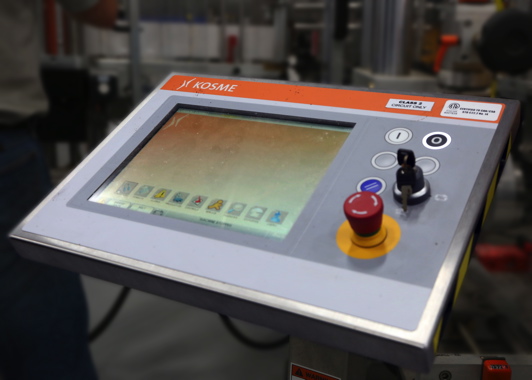
A Kosme brand control panel from Krones provides exceptional ease-of-use access for line operators in charge of the Wellington Brewery can and bottle filling lines.
The packaging line was installed in May, with a new brewhouse installed in late August.
Purchased from Newlands Systems Inc. (NSI), a company located in Abbotsford, B.C., and recognized as a distinguished manufacturer and supplier of premiere brewing equipment in North America.
“We wanted to go as Canadian as possible,” notes Davies.
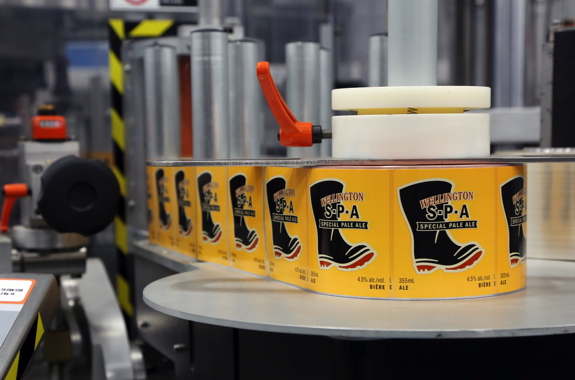
Pre-printed bottle labels supplied to the Wellington Brewery plant by Tapp Label are applied to the 335-ml glass beer bottles via a Kosme brand Flexa Sensicol model labeler.
However, when it came time to opt for new bottle and can filling lines, Davies was happy to deal with the Canadian arm of Germany-headquartered Krones Machinery Co. Ltd., who design and manufacture filling and process technology for the food and beverage industry.
“Why Krones? An easy enough answer is that Krones has been known to be the best in the industry for its filling and capping equipment,” Davies says with a knowing chuckle.
“We approached Krones, and they worked with Chris to create a turnkey system specific to the current and future needs of Wellington Brewery.”
According to Chris Sheppard, “We were originally looking at adding a pair of small units for the canning and bottling lines, but Krones correctly pointed out that what we had planned for the next five years, was inadequate.
“We were thinking too small in our big-thinking plans, which is how we purchased a Krones-Kosme hybrid line.”
“For us, moving up in scope, it was important that we not sacrifice quality,” notes Sheppard, “and we didn’t.
“The new lines provide us with everything we wanted: an ability to create great tasting beer in an efficient and safe manner; and, of course, to produce much more of it.”
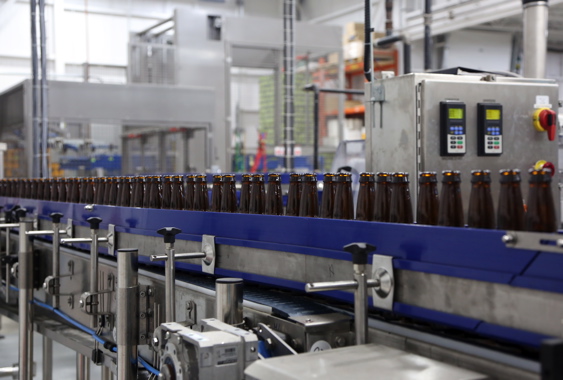
After moving onto the line by an Apsol depalletizer, the row of empty glass bottles is transferred downstream for filling by a conveyor system powered by Bonfigloli electrical motors.
The can and bottle filling lines were purchased as turnkey operations from Krones, and consist of its own Krones and Kosme brand machines, as well cherry-picked equipment from other well-known and respected suppliers.
Both lines are supplied empty packaging options of cans or bottles from a Kosme Solution by Apsol depalletizer capable of easily moving some 2,250 glass bottles or 5,086 cans per skid onto the conveyor line powered by Bonfiglioli electric motors controlled by Rockwell Corporation’s Allen-Bradley brand PanelView Plus 600 interface.
The palletizer is a pneumatic system, with air pressure causing the cylinders to clamp on and move the bottles smoothly onto the conveying line for label application and filling.
There are even robotic applications with suction grippers on the depalletizer that removes the pallet protective lidding out of the way.
The conveyors transport the bottles past a Kosme Flexa Sensicol labeler that applies pressure-sensitive labels to the front and back of the bottle, after which date coder then applies the proper lot code and best-before data onto the rear label.
The conveyor then moves the bottles, carefully flipping them upside down to be rinsed with water, purged with a jet of carbon dioxide, dried, and then righted again before being filled by a Kosme Barifill R-FC (rinser, filler, and capper) 16-valve unit.
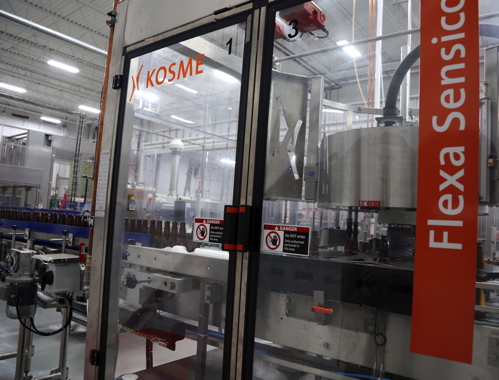
The Kosme brand Flexa Sensicol labeler from Krones easily applies self-adhesive rollstock to labels made of either plastic or paper onto a glass surface.
The Kosme Barifill R-FC utilizes robust, pneumatically-actuated Krones filling valves that allow for a fast, non-foaming filling process that helps maintain product integrity.
As the bottle enters the filling sequence, a probe is placed into it, and the bottle is bottom-filled with beer. Once the beer makes contact with the probe, it creates an electrical charge that informs the fill system that the bottle is at the optimum fill height.
The Barifill uses:
- an isobaric filler with electropneumatically-controlled filling valve functions;
- a compact valve manifold;
- rinser with several capping systems for diversity;
- no sharp corners that could allow dirt to congregate.
A short conveyor ride later, the bottles are hand-packed into six-pack paperboard trays, which are loaded inside corrugated two-four 24-bottle cases that are stacked onto shipping pallets and secured into finished, ready-to-ship loads by a Phoenix model P2150 semi-automatic stretchwrapping machine from Doverco.
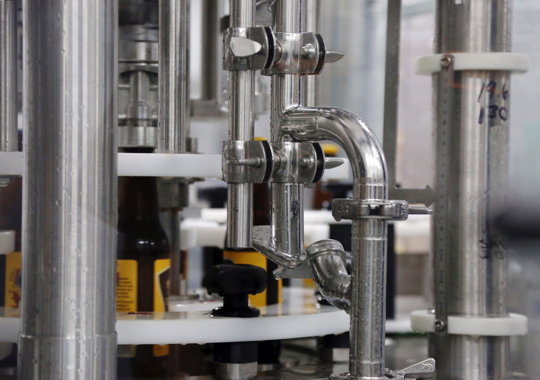
Placing a probe into each bottle to be filled, the 16-valve Kosme Barfill R-FC bottom-fills the glass containers with beer until the liquid comes into contact with the probe, which sends out an electrical charge to inform the filling system that the bottle has been optimally filled.
“For cans, it’s not too much different,” says Davies.
“After the initial depalletizing, the cans travel along the same conveyor line are then diverted towards the canning equipment.”
The pre-printed cans are open at the top, and are flipped upside down and rinsed by a McBrady can rinser.
The cans are then filled by the 24-valve Krones CraftMate can filler featuring a four-head Swiss-made Ferrum F 404G-TI seamer that adds and seals the can’s lid.
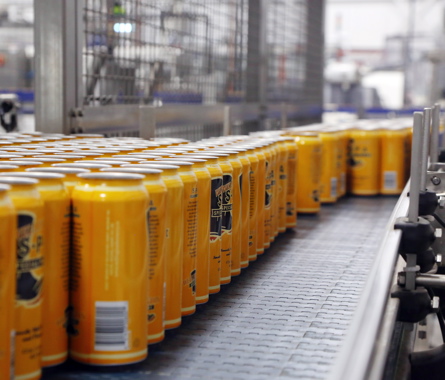
A conveyor outfitted with food-grade System Plast NG belting from Regal Beloit provides exceptionally smooth transfer for the beer cans to avoid accidental scratching of the graphics.
The modular-designed, easy-to-clean Ferrum seamer works equally well on aluminum cans as well as steel, plastic and composite applications, able to seal cans—depending on size—at speeds of 80 to 360 cans per minute.
“The Ferrum sealer was a very important piece of the turnkey system we purchased from Krones,” acknowledges Davies. “Having a perfect seal helps us ensure a quality product is being delivered to the consumer every time.”
The cans are then conveyed through a Krones Checkmat 707 F-X inspection system—a machine that utilizes X-Ray technology to ensure the fill height of the product remains within the brewer’s realm of tolerance.
For Wellington Brewery, the Checkmat 707 F-X line also verifies the presence of a properly applied lid.
“If the fill height does not match the required volume, or if the lid provides a faulty seal, the Checkmat pneumatically push-rejects the can,” explains Davies.
“The Checkmat helps increase the efficiency of our packaging line, and helps guarantee that our customers get what they are paying for,” Davies notes.
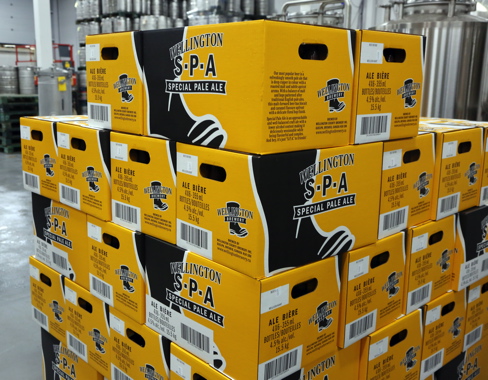
Corrugated mother-packs manufactured by Packaging Technologies Inc. (PTI) contain four six-packs of bottled Wellington Brewery beer brands per case.
To remove any can sweating caused by the cool beer contents, the cans pass through a can warmer supplied by Lagrotta Packaging Group, an innovative custom-design manufacturing company headquartered in Kitchener, Ont.
The cans are then hand-packed onto corrugated trays, have a sheet of heat-sealed plastic adhered to it and then skidded atop a pallet.
“The CraftMate is a volumetric can filler with 24 filling valves, specifically targeted for the North American craft brewing market,” notes Davies.
Before the release of the CraftMate, Krones did not have a range of can filling equipment designed specifically for the craft beer market, working with a minimum of 36-valves.
The CraftMate fills cans at a small production rate of 12,000 containers an hour—based on a 16 ounce can—and comes with a capping system with four capping heads.
And, for those times that a third-party contracting company wants to use a can of a different size or format from the typical Wellington Brewery sizes, the CraftMate can easily handle it—not to mention working with beer as easily as it does carbonated beverages.
Featuring innovative technology, the CraftMate offers:
- 24 electropneumatically-controlled filling valves;
- pressing-on and pressurization of the cans via a double-acting cylinder and differential pressure chamber;
- exact filling quality determined by inductive flow meter;
- high technological standard for oxygen pick-up and carbon dioxide consumption;
- manual carrousel height adjustment.
“We also find that the CraftMate is very easy to maintain as far as cleanliness,” notes Davies.
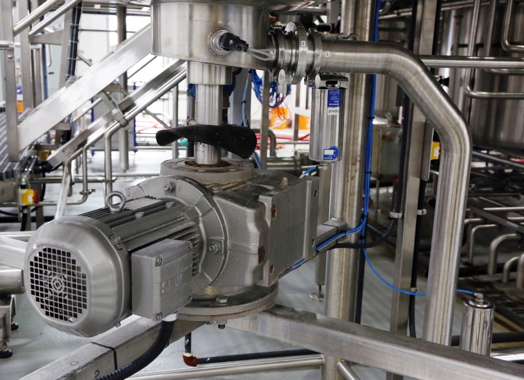
An SEW-Eurodrive motor underneath the new brewhouse supplied by Newland Systems facilitates smooth power distribution to ensure consistent quality for every brewed batch of beer.
The first real new brew was produced on September 18, 2016, and despite the relative short operating time, Davies was quite impressed with the new set-up.
“With the old brewhouse and packaging line, we had to run 24/7 over the past three years in order to keep up with demand,” relates Davies.
“With the new set-up, we work fewer hours—just two shifts—to maintain our production output, as the filling line is very quick.”
Wellington Brewery’s conveyor lines use System Plast NG belting manufactured by Regal Beloit to move the cans and bottles to and from the packaging line’s various systems with key smooth handling and transfer.
Other suppliers servicing the Wellington Brewery include:
- TricorBraun designs and supplies the glass bottles;
- Toronto headquartered Tapp Label provides the pre-printed pressure-sensitive labels applied to the bottles;
- Custom Drink Carriers of Dundas, Ont. supply the paperboard six-pack containers;
- the 24-bottle motherpacks that hold four six-packs each are supplied by the Concord, Ont.-based paperboard and corrugated packaging converter Packaging Technologies Inc. (PTI);
- Philadelphia-headquartered Crown provides the majority of the preprinted cans, though Davies says that U.K.-based Rexam with offices throughout the Americas is also a supplier;
- Royal Containers convert the trays used to hold 24-packs of cans and bottles.
Without going into specifics, Davies acknowledges that the contract brewing business Wellington Brewery has helped the company pick up capacity.
“It wasn’t too long ago that we actually used a local brewery to produce and bottle-pack our own beer,” says Davies.
“Although, we have always produced and packaged our cans and kegs.
“Everything, from our private-label business to our own beers has been one continuous cycle of growth,” says Davies.
“Steady, manageable growth.
“It’s also one of the reasons why we felt comfortable in making such a huge capital investment.”
According to Davies, even though Chris Sheppard was doing yeoman’s work with getting the expansion project into gear, “we utilized a consultant to work on our behalf between Wellington Brewery and Krones during the design and install process.”
Chiming in, Sheppard says that “whenever we did have design changes, Krones was quick to point out both the pros and cons on the line of whatever question we had.
“The level of support we received to get the project started, and continue to receive from Krones has been astounding,” observes Sheppard.
Davies concurs: “There’s nothing wrong with becoming a larger brewing entity with the best brewing and packing equipment on the market.
“It’s just good business sense, and we’re just going about it in a more efficient manner now.”
Check out the online video of Wellington Brewery on Canadian Packaging TV at www.canadianpackaging.com.
Advertisement

